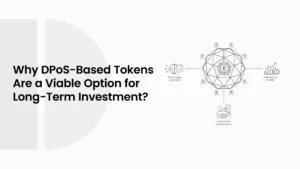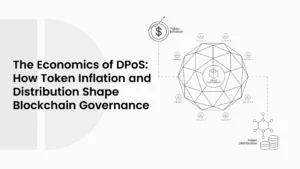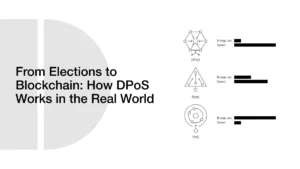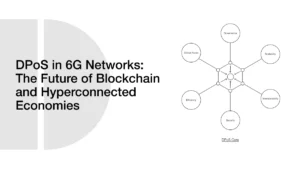Privacy in DPoS: Why It Needs Zero-Knowledge Proofs (ZKPs) More Than Ever Now
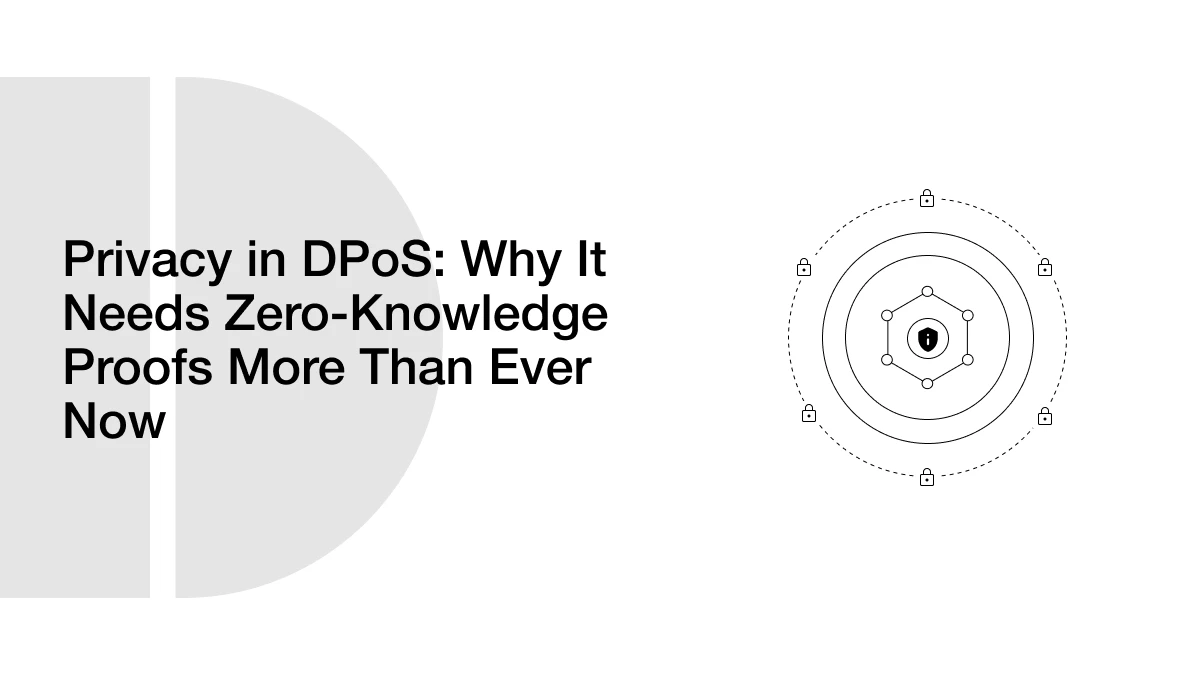
The blockchain is transforming the way we store information, transfer money, and use the internet. The one big concern, however, is still bothering people: privacy. Although blockchain is associated with being secure, it is not entirely private. Indeed, blockchain is visible to everyone and contains public information, such as wallet addresses and transactions.
- What is a Zero-Knowledge Proof (ZKP)?
- What is Delegated Proof of Stake?
- Why Privacy Is a Problem in Blockchain
- How ZKPs Can Solve Privacy Problems
- How DPoS Networks Are Using ZKPs
- Best ZKP Technologies for DPoS Systems
- Real-World Examples of ZKPs in Action
- What are the Challenges and Limitations for Zero-Knowledge Proofs?
- Conclusion
- Frequently Asked Questions (FAQs)
- Glossary of Key Terms
Zero-Knowledge Proofs (ZKPs) are where it comes in. They are mechanisms that can make individuals demonstrate that something is true without revealing any confidential information. Nowadays, most blockchains, particularly DPoS-based ones, are beginning to use ZKPs to enhance privacy.
This blog will explain what ZKPs are, how DPoS works, and why these two technologies are a perfect match for enhancing blockchain privacy and security. If you’re new to blockchain, this one’s for you.
What is a Zero-Knowledge Proof (ZKP)?
A Zero-Knowledge Proof is a clever method in cryptography. It lets someone prove they know something without revealing what that something is. Consider you want to prove you’re over 18 to use a service, but you don’t want to show your ID. With a ZKP, you can confirm your age without sharing your birthdate or name. The system will just know that you’re old enough, nothing more.
ZKPs are used in blockchain to:
- Prove identity without showing your wallet address
- Prove ownership of tokens without revealing amounts
- Prove conditions (like having enough balance) without exposing data
They make blockchain more private, secure, and trustless, meaning no middleman is needed. That’s why ZKPs are quickly becoming one of the most popular privacy tools in blockchain today.
ALSO READ: Can DPoS Blockchains Handle Over a Billion Transactions Per Day?
What is Delegated Proof of Stake?
Delegated Proof of Stake is a type of blockchain system where people vote to choose a few trusted participants called delegates or block producers. These delegates are responsible for validating transactions and creating new blocks. How does it work? Token holders vote for delegates. The top-voted delegates get chosen to run the blockchain. These delegates keep the network running smoothly.
DPoS is different from other systems like Proof of Work (PoW) or Proof of Stake (PoS) because it uses less energy, it processes transactions faster, and it gives users a voice by letting them vote. But here’s the issue: Voting on DPoS chains is usually public. That means others can see your wallet, your vote, and sometimes even your token balance. This raises significant privacy concerns.
That’s why adding Zero-Knowledge Proofs to DPoS is such a powerful idea. ZKPs can hide your vote, protect your identity, and still let you participate in governance. It’s privacy and security, working in unison.
Why Privacy Is a Problem in Blockchain
Many individuals believe that blockchain is entirely anonymous. That is not the case. The majority of the public blockchains, such as Bitcoin or Ethereum, are inherently transparent. This implies that all transactions, wallet addresses, and token movements are visible to any individual on the internet. You do not access these details by use of a password or a login. The only thing you require is a blockchain explorer.
The problem of privacy is even more severe in Delegated Proof of Stake (DPoS) networks. The reason is that DPoS enables the voters to elect delegates. These votes are usually associated with the wallet addresses of the masses. Therefore, when you vote for someone or participate in a decision, your wallet can be followed. In the long run, an individual may be able to monitor your voting records, the number of tokens you possess, and in which camp you tend to lean.
Now think about identity. In many practical blockchain applications, particularly in the health industry or the financial sector, individuals must establish their identity. Currently, it is achieved through Know Your Customer (KYC) checks. However, KYC can save and reveal personal information of users, including full names, ID numbers, and even home addresses. When such data is hacked or leaked, it may expose people to danger.
| Privacy Feature | Public Blockchain (No ZKP) | With ZKPs Enabled |
| Wallet Addresses Visible | Yes | No |
| Token Balance Trackable | Yes | No |
| Voting Identity Traceable | Yes | No |
| Data Sharing for Identity Checks | Full Data Shared | Only Proof Shared |
| Risk of Identity Theft | High | Low |
How ZKPs Can Solve Privacy Problems
| Action | Without ZKP | With ZKP |
| Voting in DPoS | The vote is public, wallet is linked to the vote | The vote is private, identity stays hidden |
| Proving token balance | Wallet and token amount are visible | Only the condition (e.g., over 500 tokens) is proven |
| Verifying age or ID | Full ID shared (name, birthdate) | Only the requirement (e.g., over 18) is proven, not the data |
| Taking part in private programs | Requires full KYC and document uploads | Only proof of eligibility is shared; no documents are needed |
Zero-Knowledge Proofs (ZKPs) can solve some of the biggest privacy problems in blockchain. They work like a smart lock. Instead of showing your keys to open the door, you just prove that you have the key, without anyone ever seeing it. In blockchain, this means you can prove something, like your age, your token balance, or your voting rights, without sharing any personal data (Lu Zhou, 2024)
Let’s say you are using a DPoS blockchain to vote for a delegate. Normally, your vote might be linked to your wallet. Anyone could see who you voted for and how many tokens you used to vote. But with ZKPs, the system only checks whether you have the right to vote. It doesn’t record your wallet address or your token count in public view. You stay anonymous, but your vote still counts.
ALSO READ: Can Social Reputation Fix Delegate Elections in DPoS Blockchains?
ZKPs are also helpful in identity verification. As an example, when a doctor has to ascertain your age to get medical services, you are not required to present a complete ID. A ZKP may be used to prove that you are old enough to enter, but without disclosing your name, date of birth, or any other information. This would enable you to comply with the rules without losing your privacy.
The other use case of ZKPs is token ownership. Assume the voting requirement of a DPoS system is that a voter should have at least 500 tokens to vote in an election. The ZKP will allow you to prove that you have more than 500 tokens, but not reveal your balance or your wallet address. All that the system needs to know is that it will say, Yes, this person is eligible.
How DPoS Networks Are Using ZKPs
Delegated Proof of Stake (DPoS) blockchains are starting to use Zero-Knowledge Proofs (ZKPs) to enhance their systems’ privacy and security. These networks rely on voting and trust, so privacy is paramount. When voters feel their information is not safe, they might stop taking part in the system. This can harm the entire blockchain network.
To fix this, DPoS networks are adding ZKPs to protect the identity of voters. For example, instead of recording the wallet address and token amount for each vote, the blockchain only records a simple proof. This proof confirms that the voter is allowed to vote, but it does not show their identity. This makes the voting system more private.
The other application of ZKPs in DPoS networks is in identity verification. Most of the networks require the users to demonstrate that they are real people or trusted members before they are allowed to vote. In the absence of ZKPs, they may need to provide personal documents or even complete KYC. However, in the case of ZKPs, they can simply demonstrate that they satisfy the requirements, such as possessing a certain amount of tokens or being a verified user, without sharing their privacy.
| DPoS Feature | Traditional Method | With ZKPs |
| Voter eligibility check | Wallet address and balance are public | Only a proof is submitted, no wallet or balance is shown |
| Voting process | Votes are linked to user identity | Votes are anonymous, but still valid |
| Identity verification | KYC or full identity documents are required | Users prove conditions (e.g., age, membership) with ZKPs |
| Participation control | Based on visible records or account history | Based on hidden, verified proofs from ZKPs |
Best ZKP Technologies for DPoS Systems
| Feature | ZK-SNARKs | ZK-STARKs |
| Trusted setup required? | Yes | No |
| Size of proof | Very small | Medium |
| Verification speed | Fast | Fast |
| Quantum resistance | No | Yes |
| Best for | Lightweight apps, low-data proofs | Secure identity systems, complex logic |
| Popular in DPoS? | Less common | More common |
When DPoS developers are willing to apply Zero-Knowledge Proofs, they most often have to choose between two types: ZK-SNARKs and ZK-STARKs. The two do the same thing; they help prove something without disclosing the details, but they do it differently. Knowing the differences will assist blockchain teams in making the right decisions about their needs.
Real-World Examples of ZKPs in Action
Zero-Knowledge Proofs are not just a theory anymore. They are already being used in the real world to solve big privacy problems in industries like healthcare, finance, and government services. These examples help us understand how Zero-Knowledge Proofs can also work inside DPoS blockchains.
In the blockchain world, several projects are already testing Zero-Knowledge Proofs in voting, finance, and asset transfers. For example, zkSync and Polygon Zero use ZKPs to hide transaction amounts and sender identities. Some experimental apps built on EOS and Tezos test anonymous voting, where token holders vote for changes on the blockchain without their wallet addresses being exposed.
| Industry / Use Case | ZKP Application | What It Solves |
| Healthcare | Patients prove age or vaccine status without showing ID | Keeps medical records private |
| Government ID Systems | Citizens prove nationality or age using ZKPs | Reduces identity theft and paperwork |
| Blockchain Voting (DPoS) | Users vote without revealing wallet address | Prevents vote tracking and user profiling |
| Financial Services | Users prove their income or credit status using only proof | Avoids leaking salary, bank statements, or documents |
| Web3 Platforms (zkSync, Tezos) | Anonymous payments or delegate elections | Adds privacy to token transactions and on-chain voting |
What are the Challenges and Limitations for Zero-Knowledge Proofs?
While Zero-Knowledge Proofs offer big benefits for privacy, they are not perfect. Many blockchain developers and users face problems when trying to use this technology. Some of these problems are technical, and others are about time, cost, or adoption.
One of the biggest challenges is complexity. ZKPs are hard to understand and even harder to build into a working app. Most regular developers lack the necessary knowledge to work with them efficiently. They need special libraries and tools, which are not always beginner-friendly. This makes real-world DPoS systems grow slowly. Performance is another issue. Some ZKPs are space-consuming and require additional computing power. This can be a massive problem in systems that wish to be both fast and cheap, such as most DPoS chains. ZK-STARKs are more future-proof and safer, but they are also more memory-intensive. They cannot be handled by any blockchain.
ALSO READ: How Regulatory Compliance in DPoS Dawns a New Era in Blockchain Governance
There is a cost, too. Zero-Knowledge Proofs usually extend smart contracts and complicate them. This has the potential to raise gas prices or transaction fees on networks that charge per step. The developers need to find a balance between adding privacy and making the system affordable. Finally, there is slow adoption. Other blockchain projects do not use the technology because it is new and complex. They might wait until other people test it out, or until tools are less complicated to use. This makes the adoption of Zero-Knowledge Proofs slower, even though the benefits are clear.
Conclusion
Blockchain technology has changed how we store, share, and verify data. But one thing it still struggles with is privacy. In Delegated Proof of Stake (DPoS) networks, where voting and identity are key parts of the system, privacy becomes even more critical. If people do not feel safe sharing their information, they may stop participating. This can hurt the whole network.
Zero-Knowledge Proofs offer a powerful solution. They allow users to prove facts, like age, identity, or token ownership, without revealing private details. This means voters can take part in DPoS elections, token holders can access services, and real users can verify their identity without sharing sensitive data.
This is how DPoS networks are beginning to adopt Zero-Knowledge Proofs for private voting, secure identity checks, and anonymous governance. Even though there are challenges, like complexity, cost, and slow adoption, the future is looking strong. As tools become easier to use and systems more flexible, more blockchains will likely adopt Zero-Knowledge Proofs. In short, the combination of DPoS and ZKPs could help build a more private, more secure, and more trusted blockchain future. The technology is here. Now it’s about putting it to work.
Frequently Asked Questions (FAQs)
- What is the main benefit of Zero-Knowledge Proofs?
Zero-Knowledge Proofs let you prove something is true without sharing the actual data. For example, you can prove you’re over 18 without showing your birthday or ID card.
- How are Zero-Knowledge Proofs used in DPoS blockchains?
They help make voting and identity checks private. You can vote or prove your membership without anyone knowing your wallet address or token balance.
- Is blockchain really anonymous?
Not always. Public blockchains show wallet addresses and transaction details. That’s why Zero-Knowledge Proofs are needed to add more privacy.
- What are ZK-SNARKs and ZK-STARKs?
These are two types of Zero-Knowledge Proofs. ZK-SNARKs are smaller and faster but need a trusted setup. ZK-STARKs are more secure and don’t need setup, but they are larger in size.
- Are any real projects using Zero-Knowledge Proofs today?
Yes. Zero-Knowledge Proofs are used in healthcare, government ID checks, and blockchains like zkSync and Tezos. Some DPoS testnets also use them for private voting.
- What’s the future of Zero-Knowledge Proofs in blockchain?
Zero-Knowledge Proofs will likely become a standard tool for privacy. As DPoS networks grow, more of them will adopt ZKPs for governance, identity, and secure data sharing.
Glossary of Key Terms
| Term | Simple Definition |
| Zero-Knowledge Proof (ZKP) | A method to prove something is true without revealing the actual data |
| DPoS (Delegated Proof of Stake) | A system where users vote for trusted people (delegates) to run the blockchain |
| Wallet Address | A unique digital code used to send or receive cryptocurrencies |
| Smart Contract | A program stored on the blockchain that runs automatically when conditions are met |
| ZK-SNARK | A small, fast type of ZKP that needs a trusted setup before use |
| ZK-STARK | A newer, larger type of ZKP that is more secure and doesn’t need a setup |
| KYC (Know Your Customer) | A process where companies verify your identity using documents |
| Proof of Work (PoW) | A system where miners solve puzzles to validate transactions (used by Bitcoin) |
| Proof of Stake (PoS) | A system where people who hold coins validate transactions based on their stake |
| Privacy Bridge | A tool that connects blockchains while hiding transaction details |

